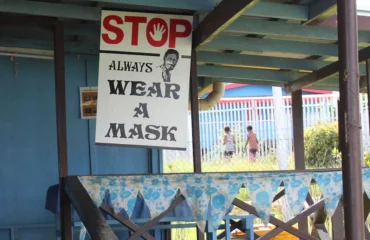Young Australians are facing significant pressure from mental health conditions. Recent data released by the Australian Bureau of Statistics showed that almost half of young women and one-third of young men aged 16-24 years were living with a mental disorder in 2020-21 .
But within these identified demographics, the mental health challenges for some specific groups remain virtually unknown. Issues related to identity, cultural impact, and mental health stigma continue to affect their everyday lives.
Growing up as an Australian-born Asian, Sherry Fang often felt ashamed of her cultural background.
She still remembers the reactions of the other kids when she brought homemade fried rice to her primary school in her lunch box. After her friends commented the food ‘looks and smells weird’, she begged her parents to please pack her lunch box with ‘white people food’, which meant a ham sandwich and an apple.
The 23-year-old grew up in a Chinese migrant family in Seven Hills, a suburban area in Brisbane, Queensland, and says she has struggled, on and off, with questions of her identity as an Asian Australian.
“Sometimes I think I am not Chinese enough, and other times I feel I am not Australian enough,” Fang says.
Isabella Cray, a 22-year-old interior architecture student who grew up in Tamborine Mountain, in the quiet hinterland of southeast Queensland, recalls similar feelings about her mixed identity.

Isabella Cray hopes to bridge the gap between her mixed identities. Photo provided by Isabella Cray.
Cray’s father is Australian and her mother is Filipino. She identifies mostly as Australian because she feels largely disconnected from her Asian heritage.
While researchers and clinicians have identified an “epidemic” in adolescent mental in Australia – particularly post-pandemic – not enough is known about the specific stressors that are affecting young Asian Australians. Dr Grant Blashki, a practising GP and the lead clinical advisor for Beyond Blue, says that notions of identity are complicated and multifaceted in Australia, and that more research is needed to better understand Asian Australians’ experience of mental health.
“For young people, it is common to be grappling with lots of different identity issues,” Blashki says. “As a GP I have observed that many young people from Asian backgrounds can find some of the cultural differences in Australia hard to adjust to, for example different values about family, parental expectations, gender roles, attitudes to the elderly and authority, and even ways of communicating.
“An important caveat is that Asian Australians are not one homogenous group so it’s really impossible to make generalisations for the entire cohort. They are a very diverse group from many different countries, many different beliefs,” he says.
“Unfortunately, even though Australia is a great country, in reality you still do get some racism and some stereotypes which can cause stress to people from different cultural backgrounds.”
Data from the Australian Human Rights Commission shows that nearly half of the Australian population was born overseas or have a parent who was born overseas, and an estimated nearly 10 per cent have Asian cultural origins or ancestry.
Despite the population’s growing number and visibility, research has found that identity issues affect Asian Australians’ mental health, and the results indicated that the more the participants adhered to Asian cultural values, the less positive their attitudes to seeking professional psychological help.
“I think each Asian subculture and family bring their own unique belief systems about mental well-being to their varied explanatory models of mental health and it’s useful for the health practitioner to spend time understanding their perspectives when discussing mental health issues and management,” Blashki says.
“Shame can be a powerful emotion in some Asian cultures. “Beliefs about mental health in many Asian cultures can be quite different to Western thinking about mental health.
“It might be associated with a sense of shame in the family, or maybe perceived as just a sign of weakness, or that maybe you just need to try harder. Maybe you just need to work harder to get better, or even that mental health issues are not a real thing,” he says.
There are signs of improvement, says Dr Hass Dellal, executive director of the Australian Multicultural Foundation. “Attitudes appear to be shifting among young people and families, particularly around the issue of shame or not wanting to be open about it,” he says.
“Those attitudes are slowly changing and have changed a great deal … I think the health and wellbeing of the young person is much more important than a cultural element,” Dellal says.
He would like to see more education on the importance of seeking help and opening up on mental health issues targeting Asian Australian families, so that young people with concerns can receive appropriate support.
“It’s very challenging for all young people, whether European, Asian, Australian or any other nationality,” says Dellal. “Growing up with the challenges that young people face today; there are obviously impacts and a lot of pressure on young people which does have an effect on their mental well-being.”

Dr Grant Blashki encourages Asian Australians to embrace their multiple identities. Photo provided by Dr Blashki.
Blashki says more research is needed to better understand how Asian Australians are managing. “There are some studies around international students particularly, but more generally, we need more research on Asian Australians’ experience of mental health.”
He says that international students with Asian backgrounds were under a lot of stress in recent years experiencing “pretty tough” conditions, such as isolation, financial pressure, and being away from home.
Meanwhile, he encourages young Asian Australians to embrace their multiple identities and cultural backgrounds. “There is richness in that (diversity), adds to Australia’s culture, our music, our arts, conversations, and it’s one of the great things about Australia.”
But for those young people who experience mental health problems, he suggests a visit to their general practitioner as a first stop. He says that in many countries around Asia, the GP (the family doctor) is not necessarily someone people think about for a mental health problem. However, in Australia, the GP is often the main gateway to the mental health system.
As a GP, Blashki has found that some of his patients prefer to see a psychologist who understands their particular cultural backgrounds.
“I was pleased to see that there’s an organisation called Shapes and Sounds, that have a practitioner list for Asian mental health, which can sometimes be really helpful if you are looking for someone expert in mental health that really understands your cultural background,” he says.
Further resources:
There are many services and resources in Australia to help young Asian Australians with mental health issues. Beyond Blue provides information and translated mental health resources for people having trouble with English.
Embrace Multicultural Mental Health is an online website run by Mental Health Australia with funding provided by the Australian Government Department of Health. It offers a range of services and comprehensive materials for people with different cultural backgrounds to tackle mental health issues.
Headspace is an organisation that specifically focuses on young people in Australia. It helps young people with physical health (including sexual health), alcohol and other drug services, and work and study support.
If you need someone to talk to, call:
Lifeline on 13 11 14
Beyond Blue on 1300 22 46 36 (if language is the issue, you can always ask for the TIS for translating and interpreter service)
Headspace on 1800 650 890
Suicide Call Back Service on 1300 659 467




